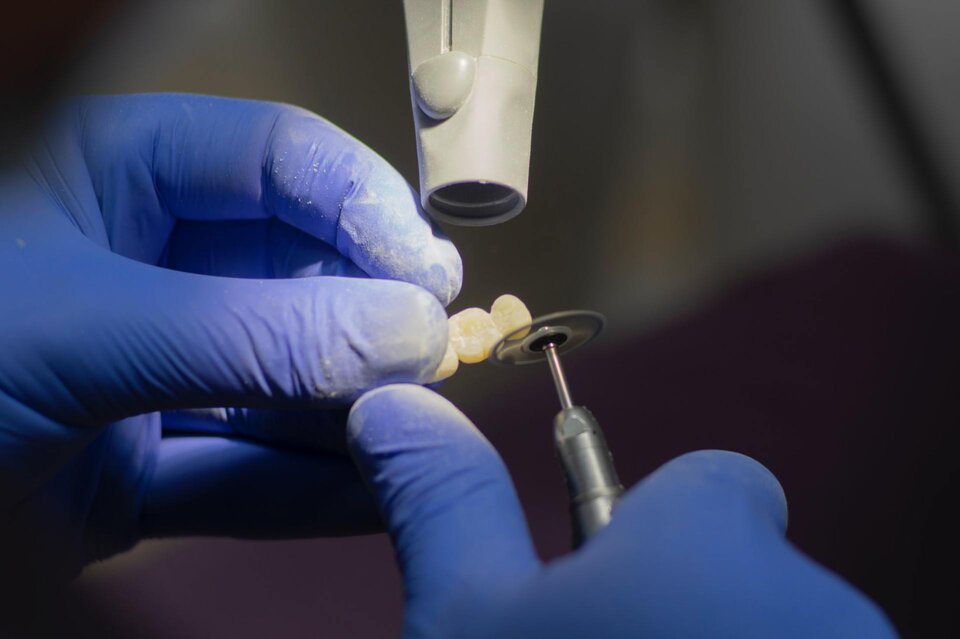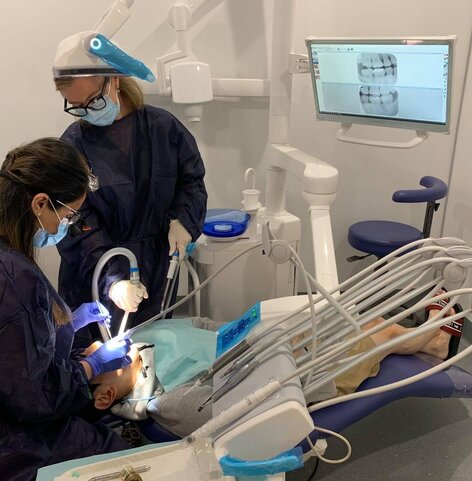Bridges
Let's Bridge That Gap!
Before dental implants, when there was a missing tooth that needed to be replaced, a dental bridge was generally the preference over a small denture. A bridge is essentially 1 or more crowns joined together to replace 1 or more missing teeth. Unlike a denture which is removable, a bridge is permanently fixed to the teeth. It is the stronger, longer term option.
A bridge uses the adjacent teeth next to a missing tooth to replace it. Just like a bridge crossing a river from where it gets its name has vertical supports either side of the river, a dental bridge requires a tooth on either side of the missing tooth to support its replacement. Basically, a crown is placed on each tooth either side of the missing one and a third crown called a pontic is joined to these other 2 crowns to form 1 strong unit. The pontic rests on the gum tissue where the tooth is missing, making it look like a tooth is coming out of the gum like a normal tooth.


One Bridge, Two Gaps.
This same principle can be applied to 2 missing teeth next to each other. In this case, you would have a crown on either side of the 2 missing teeth connecting 2 crowns in the middle to replace the 2 missing teeth. For strength, you usually wouldn’t want your bridge to be any longer than this. Typically, 1 missing tooth and 2 support teeth is the ideal arrangement.
It is also possible to hang 1 pontic off a single crown. This is called a cantilever bridge as there is only support for the pontic on 1 side. This is obviously not ideal and can only be done where the support tooth is strong enough and usually bigger than the missing tooth the pontic has to replace. This may occur at the back of the mouth where there may be no teeth behind the 1 that needs to be replaced. It is also done to be conservative and not crown another tooth if this is not needed for support. In front teeth cases where the forces on the teeth may be less, a cantilever bridge may be sufficient for strength.
Should I Get A Dental Bridge ?
Let's Bridge That Gap!
Before dental implants, when there was a missing tooth that needed to be replaced, a dental bridge was generally the preference over a small denture. A bridge is essentially 1 or more crowns joined together to replace 1 or more missing teeth. Unlike a denture which is removable, a bridge is permanently fixed to the teeth. It is the stronger, longer term option.
A bridge uses the adjacent teeth next to a missing tooth to replace it. Just like a bridge crossing a river from where it gets its name has vertical supports either side of the river, a dental bridge requires a tooth on either side of the missing tooth to support its replacement. Basically, a crown is placed on each tooth either side of the missing one and a third crown called a pontic is joined to these other 2 crowns to form 1 strong unit. The pontic rests on the gum tissue where the tooth is missing, making it look like a tooth is coming out of the gum like a normal tooth.

Frequently asked questions
Dental bridges and implants are both good long term options for replacing teeth that need to be removed or are already missing. The main difference between the two is how they replace the teeth. A dental bridge requires assistance from the adjacent natural teeth to support it. A dental implant is uses the jaw bone to support it with no direct effect on the adjacent teeth. If the adjacent teeth are damaged or have large fillings then a bridge would be beneficial to protect the adjacent teeth and replace the missing tooth at the same time. If the adjacent teeth don’t need any treatment, then an implant may be better for replacing the missing tooth.
Usually one missing tooth is replaced by a bridge. The tooth directly in front of the space and the tooth directly behind the space support the false tooth in the middle. This scenario allows for two teeth supporting a third one which works quite well in terms of strength. Sometimes, two missing teeth right next to each other are supported by one tooth either side. However, strength is reduced in this scenario as there are two teeth supporting two other teeth.
Generally speaking, a bridge is really a few crowns joined together. One crown covers the tooth directly in front of the space and another covers the tooth directly behind the space. There is usually one false tooth in the middle joined to the other two crowns. The bridge is one piece and is cemented on to the prepared teeth.
A dental bridge will usually last on average 10 to 15 years. However, it all depends on how well it is looked after. A bridge is susceptible to wear and tear just like a normal tooth in the mouth. Although a bridge itself won’t decay or become infected, the teeth it sits over and the gum and bone surrounding it can. This can cause a bridge to fail. It is important to practice good oral hygiene to ensure that the dental bridge can last as long as possible. Regular dental checkups will also allow your dentist to identify any early problems and help correct them to get even more time out of your dental bridge.

